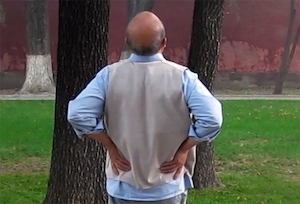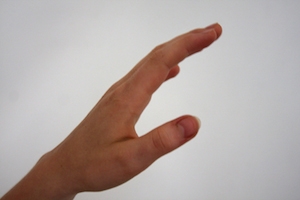Qigong and healing part 1 – Subjective effects and scientific studies
General health aspects and individual healing effects
Qigong, working with the Qi (life energy), is commonly known as furthering overall health. – However, its underlying idea of Yangsheng – nurturing of life force or short: care for life – does not automatically distinguish it from other systems of caring for health, movement methods or other forms of (therapeutic) breathing techniques.
Up until today, there are not any scientifically founded long-term studies which establish a targeted effectiveness of Qigong for specified diseases. There is also no evidence hinting at an increased efficiency of especially designed sets in comparison with other Qigong-sets on the one hand and totally different sets of movement exercises, which do not even form part of the Chinese tradition, on the other hand. It has to be added that a targeted efficiency of Qigong exercises, which is limited to special disease patterns or single symptoms, would conflict with the comprehensive systematic of Traditional Chinese Medicine. Furthermore, these effects would be difficult to prove by means of traditional scientific methods.
Therefore, for the time being we are left with the general observation that movement – which could as well take the form of a walk in the woods – may further well-being (“A rolling stone gathers no moss”). – Co-ordinated movement might in addition change (harmful) movement patterns and poor posture by and by. The co-ordination of slow movement and deep breathing, which is characteristic for Qigong, may lead to a sense of “letting go”, finding tranquillity and may provide one with ideas of how to implement this new-won calmness in day-to-day situations like the handling of an illness or stress in general.
Subjective healing effects of Qigong

Both in journals and on the internet, you can find a wealth of personal statements of practitioners who – either self-motivated or encouraged by their teachers – describe their positive experiences and attribute healing or mitigating effects to their personal Qigong practice. Especially life with a severe or chronic illness like cancer, Multiple Sclerosis or Parkinson’s disease, but also burn-out syndrome and depression may inspire practitioners to reflect the significance of their hobby in the context of their illness.
Example
Some teachers are led by these stories into portraying Qigong as effective means to fight cancer or other severe illnesses. Given the positive feedback of many practitioners, this may at first seem to be a usual element of clever marketing. – What must be viewed critically, however, is when a teacher presents him- or herself as a person with access to “powerful exercises”, which in passing transforms the instructor into a healer. The narrative of the power of specific Qigong healing exercises has a long tradition, as the first public presentation of Qigong exercises, which imprinted itself in public memory, was delivered by a woman claiming successful self-healing from cancer who wanted to spread the news. Nevertheless, all such claims of healing and self-healing and especially the direct connection to a specific set of exercises should be approached with caution. – It is often a game with hopes and fears of vulnerable people.
Possible explanations for perceived healing effects
The positive effects concerning physical and mental illnesses, which are repeatedly reported by practitioners, may root in the coordination of body and mind, in tackling the challenging task to concern oneself with one’s own body and learning to listen to its signals. Especially in times of a personal or health crisis, concentrating on the “here and now”, developing mindfulness towards oneself or simply taking regular breaks can make all the difference. Each of these aspects on its own may already prove to be the key for better life quality for individuals trying to cope with adverse circumstances – symptoms may be eased, subjectively and sometimes even measurably.
Regarding Qigong course offers which aim at specific disease patterns the social experience is also a point to be considered. Practising in a group of like-minded persons with a similar background concerning the experience of an illness and witnessing the positive example set by the instructor always forms part of the subjectively felt effect of the health exercises themselves. Also, reviving these positive feelings at home while practising may add to a sense of self-empowerment, which is crucial in dealing with the challenges of life. Sometimes these social and personal effects on one’s own attitude are attributed to Qigong in general or to a specific healing exercise in particular though there is not any objective proof for this connection.
The secret of Qigong healing
The secret of Qigong might simply be to bring things into movement, it may manifest itself in the sense of self-empowerment and in the possibilities of change it may contain. – But obviously, this is only another guess. So, if you face health problems, do not force yourself to do Qigong, because somebody tells you that exercise X will relieve problem Y. There simply is not any proof for that.
The secret may just be to find something you really like to do, to start something new, to find a new way to love life. If Qigong is for you – fine! Qigong may be an interesting journey with a big promise of change and growth.
If you prefer walking in the woods, hiking, swimming, painting, cycling, crocheting, … if you feel an urge to work out or to be creative – go for it! There is not any reason why that should not prove to be your unique way towards healing. Yangsheng – the care for life – may take many forms. Qigong is only one of them, not better, not worse than others. The choice is yours.
The ultimate secret is in doing it, wholeheartedly and with all your soul!
Why start Qigong? See reasons to start Qigong
Want to start now? Try our Qigong exercises Channel
See also: Qigong Beginner’s Guide
Qigong Healing Series
Qigong and healing working with the Qi (life energy), is commonly known as furthering overall health. – However, its underlying idea of Yangsheng – nurturing of life force or short: care for life – does not automatically distinguish it from other systems of caring for health, movement methods or other forms of (therapeutic) breathing techniques…
Scientific Studies Scientific studies about the efficiency of Qigong face a double challenge. For one thing, the cultural background of Qigong leads to a specific view of the human condition, which in part conflicts with the Western view on the human body, which lies at the foundation of “modern” medical research. An additional problem is that scientific standard methods of medical research, which determine today’s Qigong research, are to some extent unsuitable to capture typical aspects of Qigong, due to the Western image of medicine and its rootedness in a distinct research tradition.
studies – background and significance This part explains how Qigong studies refer to their subject Qigong (What is Qigong?). The most common kind of study is explained and its background and significance is explored…
research – meta-studies Apart from single test series (randomized controlled trials) Qigong research mainly consists of meta-studies and reviews. This text deals with their function and their typical findings. Contrary to what its name may indicate, meta-studies are not per se “better” studies than trial studies. The method behind meta-studies is to search data bases and …
The landscape of Qigong research The strictly practice-related approach of this kind of Wellness-Qigong research eclipses the theoretical problems; the contradictions mentioned above seem to be solved. – Regrettably, the opposite is true: The evidence produced in such a “practice-led” research cover the scientific dilemma, but do not contribute to its solution. Actually, with this research approach it does not matter at all, if one researches about Qigong or other methods (Yoga, Pilates, Zumba,…). The decision about the focus of the studies is neither related to a certain cognitive interest attached to the health method in question nor to the experimental design as such, but it is solely a question of taste or fashion…
Sources of medical research about Qigong and Healing The difficulty for all people interested in Qigong research is that with Qigong being a exercise system aimed at overall health the articles are scattered over different research areas. The question thus is: Where to start? Research conducted at university institutes is regularly published in respective scientific or professional journals, which differ in scope and importance from country to country…
Assessment of Publications on Qigong and Healing Some key points for the assessment of publications on Qigong and healing: What are possible clues for the assessment of a publication? Is a scientist a Qigong expert? Is a Qigong expert who really gets into the details of the art – i.e. „researches“ as part of his work – a scientist?
Overview Qigong Studies As pointed out above, until now there is NOT any conclusive evidence whatsoever, that Qigong – irrespective of the sets and methods trained – has any tendency to heal certain diseases or illnesses. It is also NOT scientifically proven that any health effects of Qigong are in some kind deeper, more powerful or in some other way more effective than any other movement related activity as e.g. conventional health gymnastics or other Western or Eastern sports – modern or traditional…
Cancer Healing I have been a practitioner and teacher of Qigong (Yangsheng) for many years. In the scheme of things I am reasonably well qualified and have a great deal of experience. For the past few years I have been teaching Qigong professionally to cancer patients at a Maggie’s Cancer Care Centre. I can tell you categorically that I do not teach Qigong to cancer patients in order to cure their cancer. Claims of curing cancer with Qigong are not only bold but dangerous and irresponsible. They prey on the vulnerable and desperate. Even the more well known ‘cancer curing’ Qigong methods like the Gui Lin Walking Qigong has no real scientific basis for claim.
Author: Taiji Forum
Images: Taiji Forum

